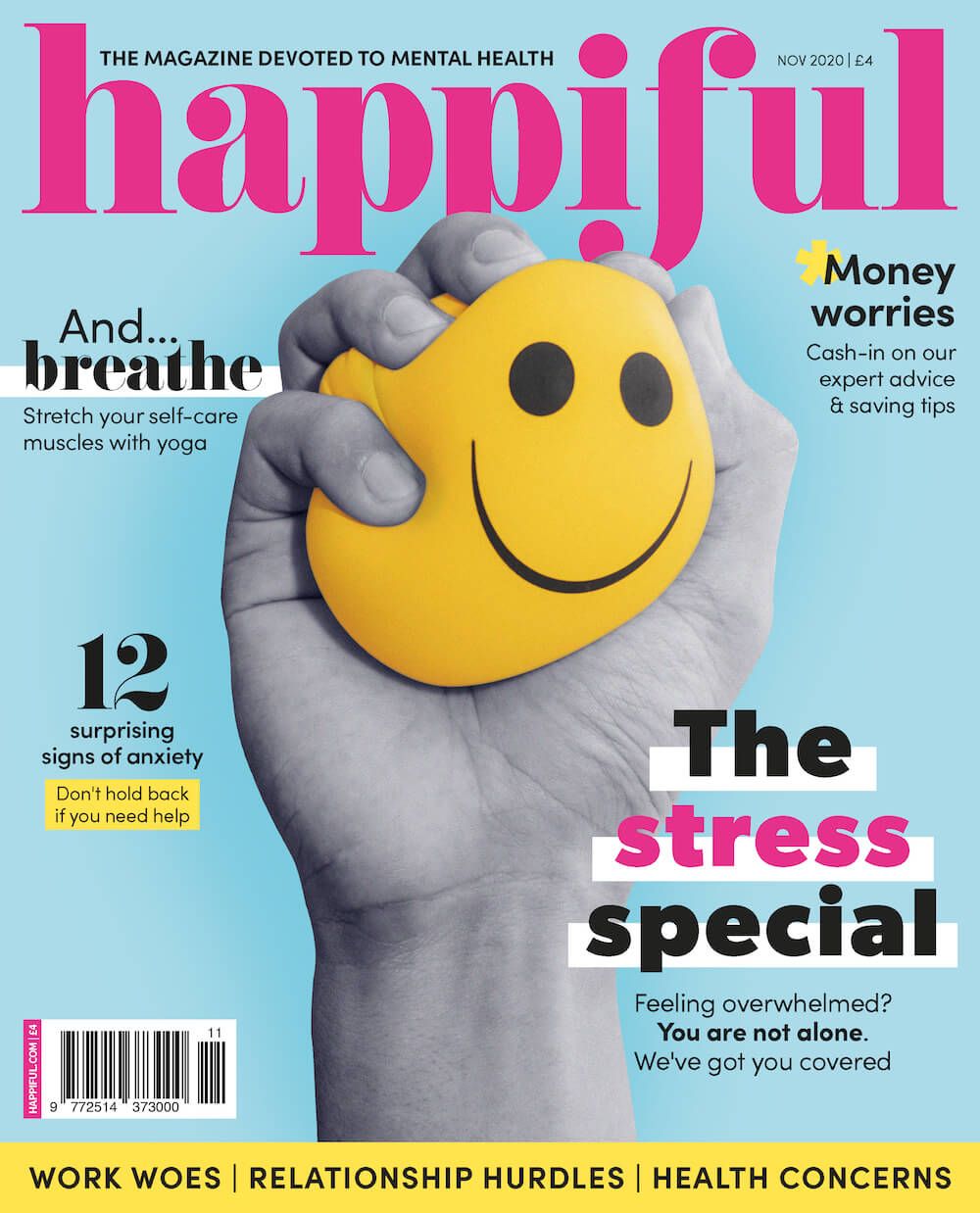In times of crisis, we all have reservoirs of emotional energy that we can call into action, to help us cope with the initial challenges. But what happens when those reserves start to dry up?
Find more exclusive stress-related content in Happiful magazine's special stress-themed November 2020 issue. Order your printed copy to be delivered straight to your door, or subscribe for our free digital edition.
Have you ever considered how, when faced with immense difficulties, we can often surprise ourselves with our response? Seemingly out of nowhere, we find the emotional strength needed to deal with the task at hand. We’re able to function to a higher capacity, and might even feel energised to face whatever challenge lays ahead of us. It might be in the wake of a natural disaster, or perhaps when a loved one is unwell or struggling – and right now, there’s one glaringly obvious, uniting challenge that people around the globe are all tackling, and that’s the Covid-19 pandemic.
Often used to describe the ways that hospitals are able to deal with emergencies in the short-term, surge capacity was first applied to our emotional range by Professor Ann Masten, psychologist, professor of child development, and expert in resilience at the University of Minnesota. Capturing our initial response to crises, this innate ability saw a lot of us through the first steps of lockdown.
Cast your mind back to March this year. Did you find yourself surprisingly energised? Perhaps open to some of the changes that came into place, finding new ways to connect with loved ones, and keeping yourself busy? Or maybe you simply carried on in a relatively normal way, able to keep your head above the water without too much trouble. That could well have been your surge capacity kicking into play – working overtime while you navigated this strange and trying new reality.
The ability to tune-in to an innate reservoir of energy is something that resonates with psychotherapist and counsellor Esther Emanuel, who notes how, as humans, we all have these resources that enable us to live from moment to moment for a short period of time, if we need to.

Illustration | Rosan Magar
“Our surge capacities vary from person to person,” explains Esther. “How and when we replenish our capacity varies too, and this is an important point to note, especially when comparing ourselves with others. It is our emotional surge capacity that determines how long we can carry on in a crisis before we are depleted.”
‘Depleted’ – that’s the key word here. Because an emotional surge capacity, like a resource capacity, is there to help us deal with the short-term effects of an emergency. None of us needs a reminder of how long we’ve been dealing with this pandemic, with uncertainty about when it will end – but it’s safe to say that any reserves we did have saved, may be starting to run low after months of work.
A depletion in your surge capacity might resemble similar feelings to burnout, as Esther recalls while reflecting on her own journey.
“I’ve experienced a depletion of emotional surge capacity personally, but not specifically during this pandemic,” says Esther. “As I remember, I felt irritable, tired, struggled to be coherent, had a loss of motivation or drive, and the feeling that I just needed to sleep – and for a long time. But these times have helped me in gaining awareness of myself and learning how to manage my emotional stress.”
As Esther learned, it is possible to replenish your surge capacity, and this will likely be in the form of self-care, and really taking the time to consider the things that we’re feeling. But something that is also key in addressing depleted surge capacity is acceptance.
Take time for you, respect your boundaries, listen to your body, and replenish your mind
We can’t always be ploughing forward at full capacity – and that goes for ‘normal’ times as much as it does the uncertain ones. And while many of us will have been able to call upon energy reserves so far, if you’re starting to run low, or you’ve already hit the bottom, accept you’ve reached your limit, and understand that wherever that limit may be for you, it’s OK. Take time for you, respect your boundaries, listen to your body, and replenish your mind.
Esther's tips to take care of yourself through sustained challenges
Ease yourself into each new day: Wake up early, walk softly and slowly, make yourself a drink. Pay attention to yourself and how you’re feeling.
Take time to check-in with yourself: Do this at least once a week so as to be aware of how you feel, and to determine what it is you need – more rest, solitude, or leisure activities.
Give yourself what you need: Be gentle on yourself. Play some soothing music. Take a bath or shower, and be aware of how the water feels against your skin. Practise self-care.
Live in the moment: Practise living as if this moment is all that you have. Also, learn to let go of your worries or cares for extended periods of time. Just be.
Esther Emanuel is a psychotherapist and counsellor. Find out more by heading to counselling-directory.org.uk
For more exclusive stress-related content, including how to stop catastrophic thinking and expert advice on financial stress, pick up the November issue of Happiful in our shop now, or in supermarkets from Thursday 22 October, or subscribe to read for free online.

3 Ways to Get Happiful Magazine
Happiful shop: Can't see your copy of Happiful in a store near you? Head to our online shop.
In-store: Pick up your copy in Waitrose, Tesco, Morrisons, Sainsbury's, WH Smiths Travel, Asda or selected newsagents. Find a store near you.
Online: Happiful is completely free to read digitally. To get our November issue in your inbox this Thursday, subscribe now.
Artwork | Charlotte Reynell


Comments